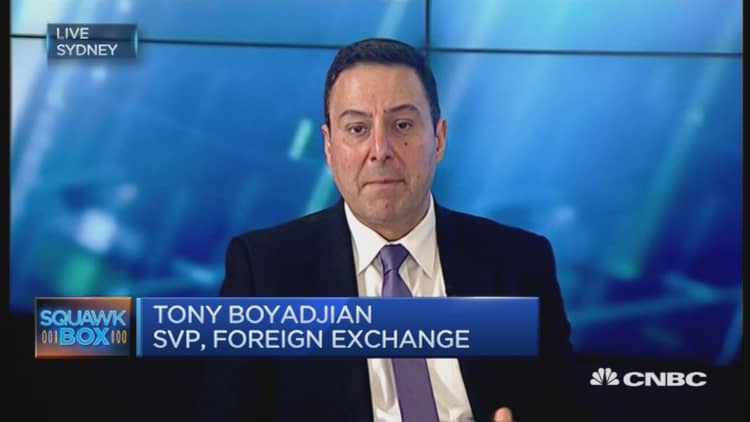Japan's economy failed to grow on a quarterly basis during the April-June period, with gross domestic product (GDP) growth coming in at zero and missing already subdued forecasts.
On an annualized basis, GDP expanded 0.2 percent, slowing dramatically from the 1.9 percent spike in the first three months of the year.
A Reuters poll of economists had predicted an annualized increase of 0.7 percent and a quarterly rise of 0.2 percent.
Market reaction was muted. The benchmark was down 0.2 percent in early trade; the data were released just prior to market open. The dollar-yen pair initially spiked as high as 101.41, from around 101.19 just prior to the release. At 8:43 a.m. HK/SIN, the pair was at 101.31.
Private consumption, which makes up around 60 percent of GDP, edged up 0.2 percent on-quarter, slowing from the previous quarter's 0.6 percent growth. Meanwhile, domestic demand's contribution to GDP was 0.3 percentage point.
"Japan's economy is likely to achieve a recovery driven by private demand though the government must be mindful of risks such as slowing emerging market growth and uncertainty over the fate of Britain's exit from the European Union," Reuters quoted the country's economy minister Nobuteru Ishihara as saying.
Some temporary factors, such as the fall in tourism following two deadly earthquakes in April, were behind the weakness in private consumption, Ishihara added.
Economists weren't fazed by Monday's poor result.
"There's been quite a lot of strength in the yen, economic uncertainty and a bounce in oil prices, so its not surprising that [Japan] is barely growing. That's been the average growth rate for the past five years," Mark Jolley, equity strategist at CCB International Securities, told CNBC's Squawk Box.
The local currency is around 16 percent higher against the greenback year-to-date, according to Reuters data.
Jolley attributed the market's high expectations for GDP growth to Japanese data generally exceeding expectations over the past three months.
"As long as Japan is growing between zero and one percent, that's a fabulous result. From the equity market's point of view, as long as you have broad stability in the economy, that will keep people reasonably comfortable with Japanese equities, so this [Monday's GDP data] is as good as you can expect," he said.

Just last week, government estimates indicated the world's No.3 economy would miss its nominal GDP goal of 600 trillion yen ($5.7 trillion) in fiscal 2020, with Tokyo now expecting nominal GDP of 551 trillion yen instead, Reuters reported. The downgrade comes despite aggressive massive monetary and fiscal stimulus from Prime Minister Shinzo Abe's economic program, dubbed "Abenomics," which had aimed to kick start the long-moribund economy out of a decades-long deflationary slump.
Last week, the government announced a stimulus package worth $278 billion in hopes of increasing GDP growth by 1.3 percent, Reuters said.
But some banks were skeptical on whether the package would be effective.
"Although the Japanese government has unveiled a fiscal stimulus package this month to invigorate growth, the actual effects could be very limited, given that fresh spending in the package is of similar size as in the previous years," DBS said in a recent note.
Monday's data reinforced hopes for more monetary stimulus. The combination of weak growth, a strong yen and moderating underlying inflation increases the pressure on the Bank of Japan (BOJ) to ease further, according to Capital Economics.
Earlier this month, the central bank pledged to increase purchases of exchange-traded funds (ETFs) but kept interest rates steady at the close of its two-day meeting, confounding expectations for hefty stimulus.
"Inflation expectations remain poorly anchored, and the prospect of a prolonged period of below-target price gains raises the risk that expectations will move further away from the 2 percent inflation target. As such, we still expect the BOJ to announce additional stimulus measures at next month's meeting, though the scale of any further easing may turn out to be disappointing," said Marcel Thieliant, senior Japan economist at Capital Economics, in a note.

